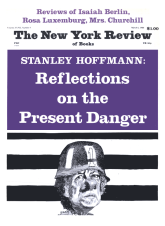In response to:
Web-Footed Gentry from the December 20, 1979 issue
To the Editors:
In his December 20 article, “Web-Footed Gentry,” Robert O. Paxton refers to bird-watching as a “non-contemplative chase.” I, as a birder of many years’ experience, would claim that it is, to many participants, a non-chasing contemplation. A bird-watcher who stands patiently for long minutes waiting for her or his object of delight to come into view, or who celebrates the totally unexpected appearance of a shy capercaillie shuffling out of a Norwegian forest, or who rejoices at thirty cattle egrets gleaning in a Portuguese mountain pasture, unperturbed by the passing train, is in a state of mind closer to the meditative than the predatory.
To enter briefly into a world outside the human, as a non-threatening neighbor to birds, is certainly not to be hunting them. As for life lists, yes, I keep them, but so do I keep an address book of my friends’ present locations and phone numbers. Would Mr. Paxton claim that I cultivate friends only in order to enter their names in a book? And while I have him pinned to the wall, what is this in his third paragraph about “William the Second of Hohenstaufen”? Surely he means Frederick the Second? William II of Hohenzollern, with whom he must have the latter confused, was a great destroyer of anything in nature that ran or flew. He apparently shot game just so he could be photographed lying on a heap of it. Now there is hunting. Please don’t call my contemplative pleasure with field glasses by the same name. I have charmed birds out of the trees by playing the recorder to them. Once they are within reach I make no effort to grab and eat them.
Anne C. Garrison
East Lansing, Michigan
Robert O Paxton replies:
As I wrote in my review, people enjoy birds in many ways. Dr. Garrison’s way is admirable. The trouble with both meditators and listers is that they can’t be bothered to take notes. The increasing numbers of birders ought to produce increasing hard information about bird numbers, ranges, and behavior in an age of rapid environmental change. If Dr. Garrison takes notes as well as plays them in the field, she is a paragon.
It was, of course, Frederick II of Hohenstaufen. William was a “bad call,” in birders’ parlance. I have been studying too much contemporary history, or am too often afield.
This Issue
March 6, 1980



